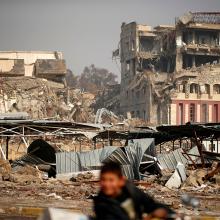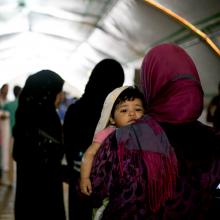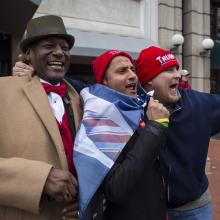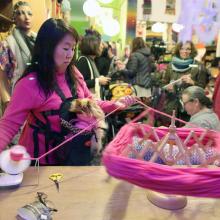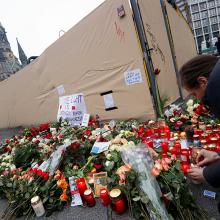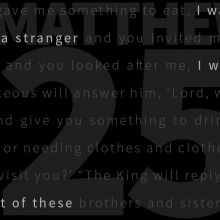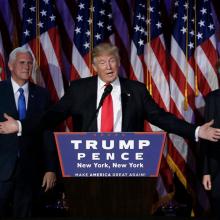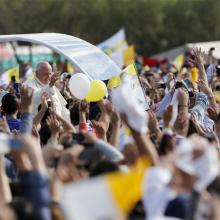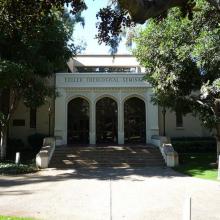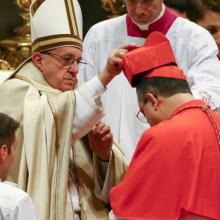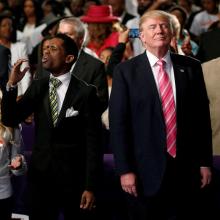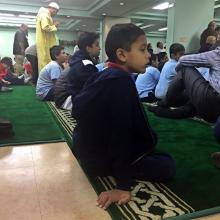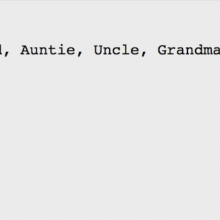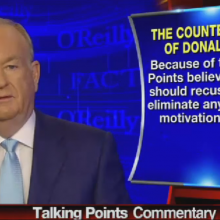immigrants
In other comments published Monday, Chaldean Patriarch Louis Raphael I Sako of Baghdad also said Trump’s policy of preferential immigration for Christians was a “trap” and would “create and feed” tensions with Muslims.

Screenshot, Screen Actors Guild Awards/Facebook
“I think what I’ve learned from Moonlight is we see what happens when we persecute people. They fold into themselves. And what I was so grateful about in having the opportunity to play Juan was playing a gentleman who saw a young man folding into himself as a result of the persecution of his community and taking the opportunity to uplift him and tell him that he mattered, that he was okay, and accept him, and I hope that we do a better job of that.”
I want to ask: Where is Jesus when you call for a ban and a wall? But the answer is clear. Jesus is with them: the ones we’ve turned away, the ones we allow to suffer out of fear and hate. Jesus is holding the hand of the scared child being detained in an airport backroom. Jesus is breaking bread with our neighbors on the far side of the wall and our siblings seeking refuge across the world. And Jesus is saying to us, “come and follow me.”
America is beautiful because we have the power to define what it means to be American.
Too often, we immigrants define what is "American" by what white culture tells us it should be. We internalize colonialism and let it run thickly in our veins: We give our offspring English names because we’re embarrassed of our language, or afraid that our children won’t be accepted with anything too “exotic.” We eagerly give up a culture that so proudly raised us. I’ve watched as we villainize black people and turn our backs on undocumented immigrants.
On Jan. 21, I’ll join thousands in D.C. for the Women’s March on Washington. My first stop will be at a local congregation, one of several hosting a prayer service and warming station for marchers. I’m an anti-racist, feminist, Christian, and for me, faith will be part of the day.
I’ve been disappointed with Christian silence, and even active resistance, to social justice imperatives, but my commitments to justice stem from my faith, and that’s why I march.
Religion is increasingly viewed as highly politicized, not least due to the way that it is frequently covered in the news. Numerous studies have shown that news stories with emotional cues tend to both gain audience attention and prolong audience engagement.
It may therefore come as no surprise that online debates about religion are packed with emotional cues that evoke strong reactions from those who participate in them. This sets the stage for passionate online debates.
The deadly truck rampage through a Christmas market crowd here marked a new setback for Chancellor Angela Merkel’s hopes for political survival at a time when opposition is growing over her open-door policy for migrants.
Many people are still reeling from the election results and become more appalled every day with the appointments and behavior of the President -elect Donald Trump.
And many of our Sojourners readers are asking themselves and us: What can I do?
The politics going on now are indeed beyond our control — but we can control what we do with our own faith and with our own actions.
If President Obama’s appearance at the Notre Dame commencement in 2009 sparked an unprecedented uproar among American Catholics, imagine what inviting President Trump to graduation might provoke.
That concern is making Notre Dame’s president, the Rev. John Jenkins, think twice about making a pitch for the incoming U.S. president to receive an honorary degree, an appearance that almost any school would normally covet — and one that the iconic Catholic university has been more successful than others in securing.
If I’ve learned anything since my time in Rome, it’s that people — not just Catholics — are hungering to connect peace with justice. This is why those of us who traveled to Rome just before the election, accompanied by Stockton, Calif., Bishop Stephen Blaire, and Houma-Thibodaux, La., Bishop Shelton Fabre, are preparing for a regional WMPM meeting in Modesto, Calif., in February.
Fuller Theological Seminary has joined a growing list of schools where administrators are being pressed by students, alumni, and faculty for designation as a sanctuary campus.
In the aftermath of Donald Trump’s election as president, some campuses are considering the moniker “sanctuary campus,” which generally means that the university will not willingly give the government information about their students, staff, or faculty who are undocumented immigrants.
At a solemn ceremony in St. Peter’s Basilica, to elevate 17 new cardinals, Pope Francis, on Nov. 19, delivered a ringing plea to the world, and his own Catholic Church, to reject “the virus of polarization and animosity," and the growing temptation to “demonize” those who are different.
The pontiff’s address came across as a powerful, gospel-based indictment of the populist and nationalist anger roiling countries around the world, displayed most recently by the stunning election of Donald Trump as president of the U.S.
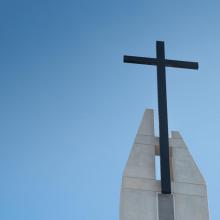
Image via Thanate Rooprasert/Shutterstock.com
First came the mayors of New York, Chicago, and Seattle declaring their cities “sanctuaries”, and saying they will protect undocumented immigrants from President-elect Donald Trump’s plan to deport them.
Then thousands of students, professors, alumni, and others at elite universities, including Harvard, Yale, and Brown, signed petitions, asking their schools to protect undocumented students from any executive order.
Now, religious congregations, including churches and synagogues, are declaring themselves “sanctuaries” for immigrants fleeing deportation.
I fear now, as I have feared for months, the impact of his presidency on vulnerable people — including the white and working-class voters in places like my home state of Ohio who lent him their support.
Christians always have disagreements about policy proposals or party platforms during election seasons. But this year, I wonder how white Christians who read the same Scriptures and hold many of the same beliefs that I do could support a man who in word and deed has flaunted the core teachings of our faith.
On the day after the election, Mervat Aqqad’s 7-year-old son woke up and asked who got elected president.
When Aqqad broke the news to Ibrahim, a second-grader at the Al-Iman School in Raleigh, his first question was, “Do we have to move now?”
This week Asian-American women leaders at American University in Washington, D.C., released a video of local Asian Pacific Islanders reading a letter of solidarity in support of the Black Lives Matter movement.
The collaborative letter was drafted online last month as Asian Americans across the country responded to the shootings of Philando Castile and Alton Sterling, black men killed recently by police officers.
While many Republicans — even those who support Donald Trump as the Republican presidential nominee — are going on the record condemning Trump's recent attack on Judge Gonzalo Curiel, saying the federal judge cannot be impartial in the Trump University civil fraud lawsuits because of his "Mexican heritage." House Speaker Paul Ryan, who just last week announced his support, said Trump's comments were "out of left field," and that he "completely disagree[s] with the thinking behind that."
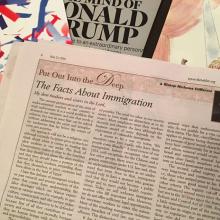
Image via David Gibson / RNS
The Roman Catholic bishop of Brooklyn, one of the largest and most diverse dioceses in the U.S., is defending immigrants in a powerful essay that — without mentioning names — seems to take direct aim at Donald Trump and his supporters by ripping the “racist and xenophobic tendencies” in society and arguing that immigration in fact helps the economy.

Pope Francis at a general audience, April, 30, 2014. softdelusion66 / Shutterstock.com
Do you remember the video clips of 5-year-old Sophie Cruz dashing across Constitution Avenue to Pope Francis’s popemobile during his visit to Washington, D.C., last September? The story of that encounter went viral: a young child with undocumented parents from Mexico who was granted permission to approach the pope, give him a letter, and receive a hug.
At the time, many seemed surprised by encounters like these during the pope’s U.S. trip — particularly that he would choose to make personal contact with the realities faced by marginalized populations. But this encounter-centered approach has been Francis’ way of operating since the outset of his pontificate.

ArtMari / Shutterstock
WITH THE GLOBAL refugee crisis worsening every day, thank goodness we’ve put the Christmas season behind us, what with its pesky reminders about welcoming the stranger, finding room for weary travelers, and great things coming from little poor kids. It got pretty uncomfortable there for a while.
To compensate, some of us even started altering our long-held perceptions with a critical eye, like maybe Joseph and Mary should have called ahead to reserve a room, or used Uber instead of that donkey, or at the very least packed better for the baby. Swaddling clothes just don’t cut it as a lining for your standard manger, and straw is no substitute for a quilted blanket. I know for a fact that straw pokes uncomfortably through most fabrics, something I learned as a young boy who thought he could jump into some hay bales after being told not to, and then stood in front of his parents, covered in straw, and denied it. (On laundry day, mom cleared out the lint trap with a pitchfork.)
As a nation, it seems we lost some of our yuletide spirit this past season, and I’m not just referring to the palpable lack of gratitude expressed by family members when unwrapping the gifts I had lovingly purchased at the Dollar Store. With almost 4 million refugees fleeing Syria, many of our political leaders responded in ways that seemed inappropriate. Maybe not as inappropriate as giving frankincense and myrrh to a poor newborn (a month’s diaper service might have been the better choice), but surprisingly uncompassionate. The U.S. agreed to take only 10,000 of the refugees, less than 1 percent of the growing total, but even that was 100 percent too many for most Republican governors. To be fair, their reluctance does comport with the nation’s long-standing decree: “Give me your tired, your poor, your huddled masses, after a two-year wait, a background check, a blood test, and a cavity search, yearning to be free of these several questionnaires which we’ll process right after lunch.” (It wouldn’t all fit on the front of the Statue of Liberty, so it continues on the back. A lot of people miss that.)
